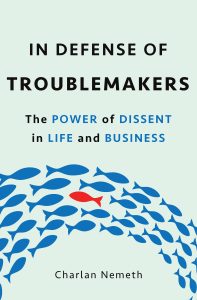My new book “In defense of troublemakers: the power of dissent in life and business” just launched March 20, 2018. t is a personal book as well as a professional one, being the culmination of a lifetime of thinking and researching influence –in particular, the power of both consensus and dissent.
The bottom line is “there are perils in consensus” and “there is value in dissent”. It took me over 200 pages to describe the thinking and work, as well as important news stories that put a ‘face” on the phenomena. It actually took me 250 pages but the editor wanted it streamlined.
I’ve been delighted by the response via numerous interviews by NPR stations, Second City, Groks Science, Freakonomics but was especially pleased by a lengthy and thoughtful review on the entire right column of the Opinion page of the Wall Street Journal (May 10, 2018).
In subsequent posts, I’ll share with you a paragraph or so of that review that taps the applicability of the ideas. So often we academics write for each other and the ideas remain in journals. I’ve come to appreciate the power of ideas in social psychology and also the difficulty in conveying them well to a broader audience. It’s been a long, reflective and learning process.

 Cal has a new program to raise debate…
Cal has a new program to raise debate…